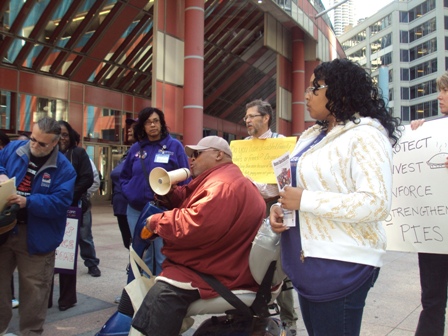Several years ago, Henry Williams was sitting in wheelchair under a tree outside of a nursing home. While sitting there, a woman who helps people with disabilities move out of nursing homes called his phone. Williams followed up on the phone call and eventually found his own place to live in the community.
“I would still be in the nursing home if it wasn’t for that [call],” Williams recalls.

In addition to the phone call, Williams would not be able to live in his own apartment without the support of personal assistants. Living with diabetes and now using a scooter, Williams receives four hours of personal assistance services three days a week. The personal assistants help with cleaning, bathing, personal care, and some of the cooking. If he didn’t have personal assistant services, Williams says “I don’t know what would happen . . . the world would be a hell of a difficult place.”
Williams is able to live independently in his own apartment with the support of the Home Services Program, in which he is enrolled through Medicaid. Like thousands of others, Williams’ independence is threatened by $2.7 billion in proposed cuts to Illinois’ Medicaid budget.
Proposed cuts to Medicaid include cutting eligibility to the Home Services Program.
Thinking about what would happen if his hours or services were cut, Williams says, “most likely I’d have to go back [to the nursing home].”
While budget cuts are intended to save money, if Williams and others are forced back into nursing homes because they lack the support they need to live in their own apartments, the state will end up spending more money. On average, nursing homes cost thousands of dollars more per year than Home Services.
Williams is taking action against the proposed cuts. This spring, in addition to attending budget rallies in Chicago, he has made a few trips to Springfield to educate legislators about the critical need for Medicaid funded Home Services. In Springfield last week, Mr. Williams made his way through the capitol and through the Stratton Building, talking to legislators and legislative staff. He flagged down Senator Kwame Raoul, urging him to support SB 3913, which would fully fund and protect services and eligibility in the Home Services Program, and he caught Majority Leader Barbara Flynn Currie as she left the House Chambers, telling her about HB 6141, the companion bill in the House.
Williams is not only advocating for himself. He is representing the thousands of others whose independence will be threatened if they lose access to Home Services.
He is fighting for people like Thomas Holliday. After spending three years in a nursing home, Holliday now lives in Chicago’s Jackson Square neighborhood. He lives independently with the support of more than 20 hours a week of personal assistants through the Home Services Program.
Under one of the Illinois Budget proposals, the state would restrict eligibility into the program by raising what is called the Determination of Need Score. Though he would be unable to live independently without personal assistants, if the budget is passed, according to his Determination of Need Score, Holliday would not qualify for the program.
“I don’t want to be anywhere near it,” Holliday says when speculating on the prospect of going back to the nursing home. “I’d rather live in my own apartment.”
Jimmy Yarbrough’s independence is also threatened by the budget cuts. Similar to Holliday, he could lose eligibility to personal assistants because of his Determination of Need Score.
Yarbrough, living on Chicago’s Westside, receives about 30 hours a week of support. Yarbrough moved out of a nursing home in November of 2011. He is looking forward to the summer, when he plans to challenge people in the park to games of chess and volunteer in local programs. But if he loses the support of the personal assistants, he won’t have the chance. If it came down to living in his own place or a nursing home, Yarbrough says, “Hands down, my own apartment. That’s why personal assistants are so important.”
Home Services and personal assistants are not only important to the people like Williams, Holliday and Yarbrough who, outside of nursing homes, now live independently and contribute to their communities. Without those services, hundreds of people, if not more, will be forced into nursing homes. Costing thousands of dollars more per year than Home Services, nursing home service will quickly eliminate any short term savings the proposed state budget could offer.
Not one to wait around for bad things to happen, Williams is undaunted by the threat of cuts. Instead, he continues to speak up and advocate for his ability to live independently in his own home instead of nursing homes.
When asked what should be done to preserve the independence of people with disabilities, he said, “You better get off your butt and do something.” From now until the final votes are taken on the Illinois Budget, Williams and many others will keep doing just that.


















Be First to Comment